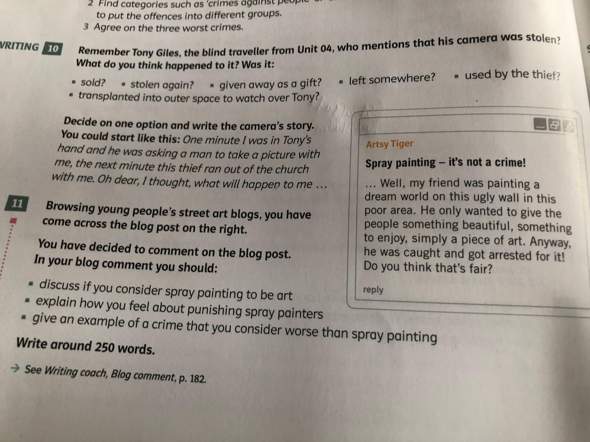Blog comment korrigieren: bitte helft mir, die hausübung wird sogar benotet?
Hallo, das war die Angabe (Nummer 11):

Könnt ihr bitte meinen Blog comment korrigieren, umschreiben, alles was geht, damit es ein guter text wird? ich würde mich echt freuen, es wird sogar benotet, bitte hilft mir dabei:
Hi Artsy Tiger,
there is a difference between spray painting and vandalism. If your friend use to paint an wall, which is not someone’s property, then it is not viewed as vandalism. However, if he painted for example a school or a market wall, can be considered as a crime and it may also carry consequences because of damaging the property belonging to others without permission. It is important to respect other people’s property and seek permission before making any changes on it, like spray painting.
So, as already mentioned and also according to the law, spray painters painting on public property without permission is considered illegal and can result in serious consequences for the artist. I guess, your friend was not properly informed about this and didn’t do it on purpose, maybe for fun. I mean, spray painting is also a form of art, just not the typical type of art. I can imagine that they are doing it from their heart, let their voices hear and from the experience of something that really impacts them like your friend, who painted his “world” on the wall.
By the way, there are many crimes in general considered worse than spray painting, such as violent offenses like assault or murder, which can cause physical harm or death to others.
I don’t know if it was fair though but I hope that your friend gets released as soon as possible!
2 Antworten

Hi Artsy Tiger,
there (RS = Rechtschreibung) is a difference between spray painting and vandalism. If your friend use (Grammatik) to paint an (Grammatik, RS) wall, which is not someone’s property (umformulieren, "das niemandem gehört"), (then - optional) it is not viewed as vandalism. However, if he *1 painted (Komma) for example (Komma) a school or a market wall, (Hier fehlt das Subjekt.) can be considered as a crime and it may also carry (Wort) consequences because of damaging the property belonging to others without permission. It is important to respect other people’s property and (Ich persönlich würde hier "to" einfügen.) seek permission before making any changes on it, like spray painting.
So, as already mentioned and also according to (---) law, spray painters painting on public property without permission is considered illegal and can result in serious consequences for the artist (Ich würde hier den Plural vorziehen.). I guess, your friend was not properly informed about this and didn’t do it on purpose, (Mir persönlich fehlt hier "sondern".) maybe for fun. I mean, spray painting is also a form of art, just not the typical type of art. I can imagine that they are doing it from their heart, let their voices hear and from the experience of something that really impacts (Wort) them like your friend, who painted his “world” on the wall. - they, them, their - wer ist damit gemeint?
By the way, there are many crimes in general considered worse than spray painting, such as violent offenses like assault or murder, which can cause physical harm or death to others.
I don’t know if it was fair though (Komma) but I hope that your friend gets released as soon as possible!
*1: Genau wie im Deutschen ist someone = jemand zwar 3. Person Einzahl. Man nutzt also das Singularverb.
Was der Muttersprachler dann aber inkonsequenter Weise macht, da das Geschlecht von someone nicht bekannt ist, er fährt mit they oder their fort.
--------------------
Das Fettgedruckte muss korrigiert, das Kursivgedruckte überdacht werden. Ich hoffe, ich habe nichts übersehen.
Für das Vokabular und die Rechtschreibung empfehle ich ein gutes (online) Wörterbuch, z.B. pons.com,
für die Grammatik ego4u.de und englisch-hilfen.de - und Finger weg vom Google Übelsetzer und seinen tr.tteligen Kollegen!
:-) AstridDerPu


War das Komma hinter der Gruß- und der Schlussformel im englischen (Geschäfts)brief früher zwingend notwendig, ist es heute optional, d.h. es kann geschrieben werden, muss aber nicht.
Setzt man im Englischen nach der Grußformel ein Komma, setzt man auch hinter der Schlussformel eines und umgekehrt, also kein Komma hinter der Grußformel -----> kein Komma hinter der Schlussformel
Komma oder nicht, anders als im Deutschen geht es im Englischen mit einem Großbuchstaben weiter.
Also z. B.:
Dear Sirs(,)
We would like to invite you to our .....


Absatz 1:
If you friend was painting on a wall
However, painting on a school wall or a market wall can be considered a crime
Absatz 2:
Streich den letzten Satz raus (I can imagine that...)
Der Rest passt meiner Ansicht nach so.


Mir wäre nichts aufgefallen. Was die Rechtschreibung und Grammatik angeht befindest du dich denke ich zwischen einer 1-2. Würde mir da keine Sorgen machen :)
Was ist an „there“ falsch also gleich in der ersten Zeile? Danke!! :)